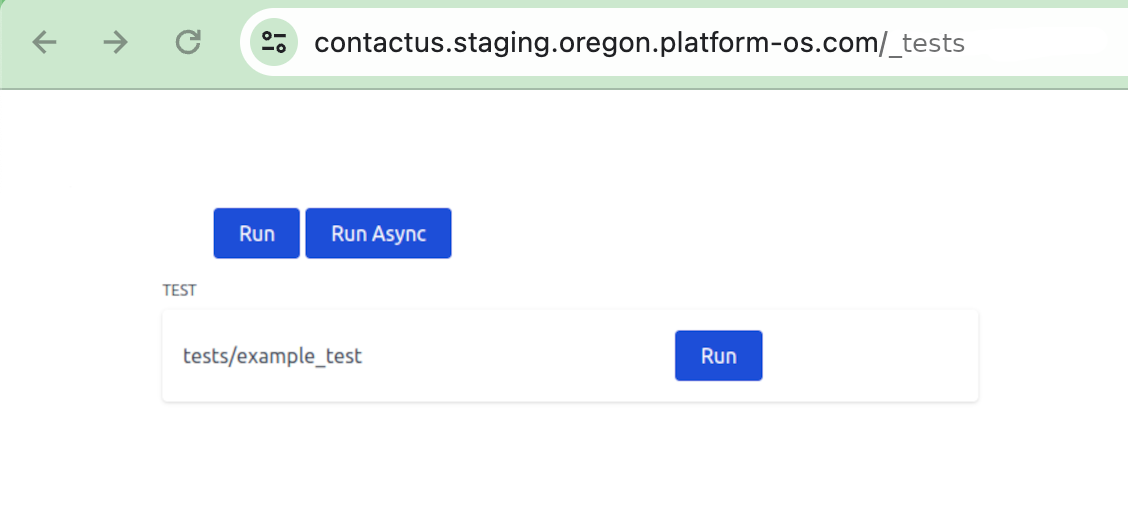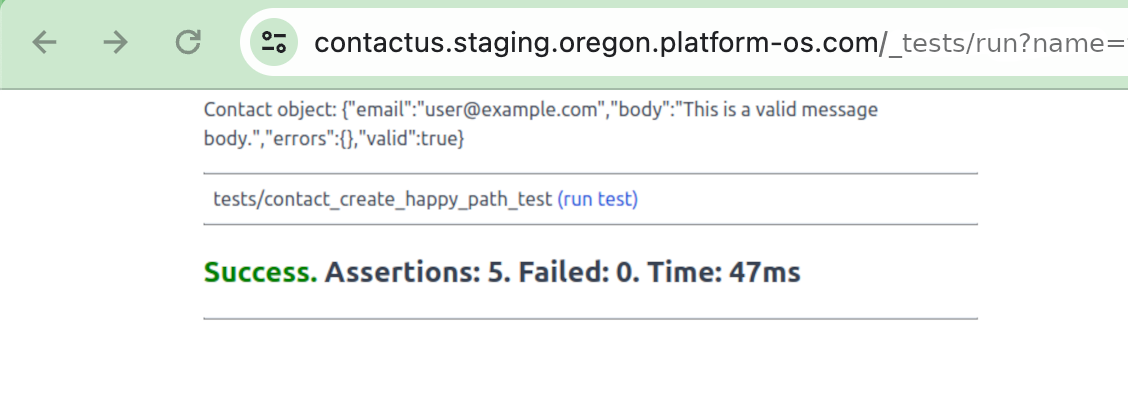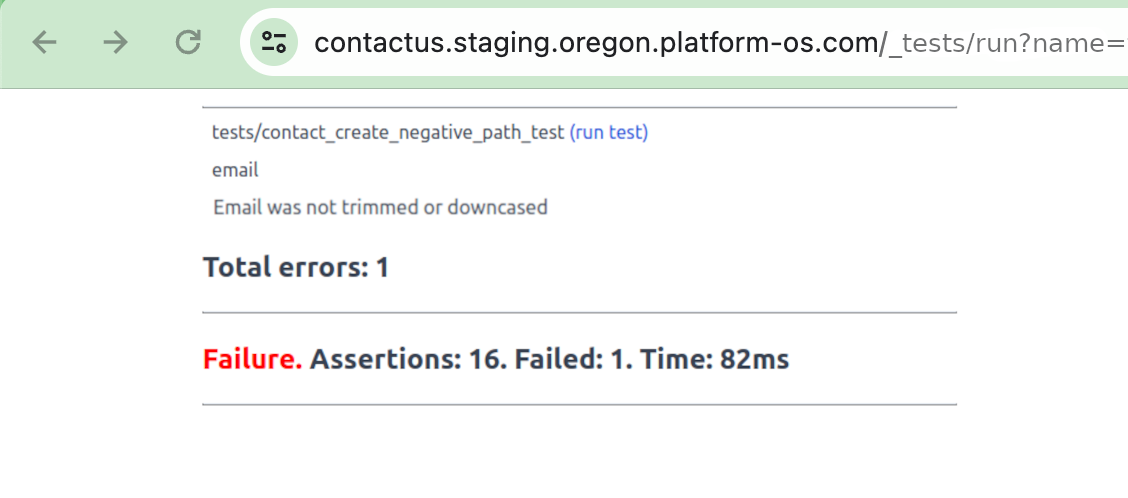Testing validation logic in contacts/create command
At this point, it's a good idea to add automated tests for the 'contacts/create' command's validation logic, so we don't have to check it manually each time.
Introduction to platformOS Tests Module
The platformOS Tests Module provides a way to write and run unit tests using Liquid. It is designed for testing commands, validations, and even email-sending behavior in a modular and repeatable way.
Key Features
- Run unit tests written in Liquid.
- Validate data structures, function results, and error messages.
- Simulate function calls and check results with built-in assertions.
- Group multiple tests into a single file.
Working with Tests Module
All test files must be placed under lib/tests/.
File names must end with _test.liquid.
Test Structure
Each test:
- Prepares input data if needed.
- Calls a Liquid function or command.
- Makes assertions using
modules/tests/assertions/*.
Available Assertions
| Assertion File | Pass Condition (Expectation) | Failure Condition (Error Trigger) | Example Usage |
|---|---|---|---|
| blank | object[field_name] is blank (nil, "", [], etc.) |
Field is not blank | function contract = 'modules/tests/assertions/blank', contract: contract, object: data, field_name: 'optional_field' |
| presence | object[field_name] has any non-blank value |
Field is blank | function contract = 'modules/tests/assertions/presence', contract: contract, object: user, field_name: 'name' |
| not_presence | object[field_name] is blank |
Field has a value | function contract = 'modules/tests/assertions/not_presence', contract: contract, object: data, field_name: 'legacy_field' |
| true | Value (or object[field_name]) is truthy |
Value is false/blank |
function contract = 'modules/tests/assertions/true', contract: contract, field_name: 'is_active', value: true |
| not_true | Value is falsey/blank | Value is truthy | function contract = 'modules/tests/assertions/not_true', contract: contract, field_name: 'is_deleted', value: false |
| equal | given == expected (exact match) |
given ≠ expected |
function contract = 'modules/tests/assertions/equal', contract: contract, field_name: 'email', given: user.email, expected: '[email protected]' |
| object_contains_object | Every key:value in object_contains exists in given |
Missing key or mismatched value | function contract = 'modules/tests/assertions/object_contains_object', contract: contract, given: profile, object_contains: '{"role": "admin"}' |
| invalid_object | object.valid is false |
object.valid is true |
function contract = 'modules/tests/assertions/invalid_object', contract: contract, object: invalid_form, field_name: 'form' |
| valid_object | object.valid is true |
object.valid is false |
function contract = 'modules/tests/assertions/valid_object', contract: contract, object: form, field_name: 'form_submission' |
| not_valid_object | Same as invalid_object (expects invalidity) |
object.valid is true |
function contract = 'modules/tests/assertions/not_valid_object', contract: contract, object: invalid_data, field_name: 'data' |
Key Notes:
- Truthy/falsey: Follows Liquid’s logic (e.g., empty strings/arrays are falsey).
- Blank: Explicitly checks for
nil,"",[], or empty hashes. valid_objectvsinvalid_object: Tests thevalidflag on objects (common in form/validation contexts).object_contains_object: Partial match (subset check) for nested structures.
All assertions receive and return a contract object that collects errors and tracks the number of checks performed. If a condition is not met, an error is registered in the contract.
Automatic testing
We will check the behavior of commands/contacts/create to ensure the command properly validates user input for a contact form. Our tests will cover both valid and invalid inputs using various assertion types.
Tip
You can check out the final code for this step by using the checkpoint-testing tag in the tutorials-contact-us repository.
Run the following commands to view the code as it appears at the end of this chapter:
git checkout tags/checkpoint-testing
git checkout main Install Tests Module
Let's start by installing the Test Module on our instance. Make sure you are in the project root, then run:
pos-cli modules install tests
pos-cli modules download tests
Deploy to your instance if needed:
pos-cli deploy staging
Now, visit the project page URL /_tests to open the test runner GUI:

Although the example test doesn't contain any assertions and always passes, you can run it to see how the test runner acts.
Create a directory for tests
Let's create a directory for your tests within the 'app' directory:
mkdir -p app/lib/tests
Add a test file - happy path scenario
This test covers the happy path - a case where the user input is valid and everything should work as expected. By verifying that valid input produces a correctly processed contact object, we create a baseline to confirm that the core logic functions properly before testing failure cases.
To do that, create a contact_create_happy_path_test.liquid file in app/lib/tests/ and add the following code:
app/lib/tests/contact_create_happy_path_test.liquid
{% comment %}
Test: Valid input - should be considered valid
{% endcomment %}
{% liquid
assign data = '{ "email": "[email protected]", "body": "This is a valid message body." }' | parse_json
function contact = 'commands/contacts/create', object: data
# 1. Contact should be valid
function contract = 'modules/tests/assertions/valid_object', contract: contract, object: contact, field_name: 'contact'
# 2. Email should be downcased
assign expected_email = '[email protected]'
assign given_email = contact.email
function contract = 'modules/tests/assertions/equal', contract: contract, expected: expected_email, given: given_email, field_name: 'contact.email'
# 3. Body should match
assign expected_body = 'This is a valid message body.'
assign given_body = contact.body
function contract = 'modules/tests/assertions/equal', contract: contract, expected: expected_body, given: given_body, field_name: 'contact.body'
# 4: Assert the contact.valid is true
function contract = 'modules/tests/assertions/true', contract: contract, object: contact, field_name: 'valid'
# 5: Errors should be blank
function contract = 'modules/tests/assertions/blank', contract: contract, object: contact, field_name: 'errors'
%}
# 5: Debug print
<p>Contact object: {{ contact }}</p>
Let's break down the test:
1. Setup Test Input
assign data = '{ "email": "[email protected]", "body": "This is a valid message body." }' | parse_json
This line builds a test object (a mock user submission) with:
- A valid email but in uppercase
- A body with enough length to pass validation
This mimics what would be submitted from the contact form in views/pages/index.html.liquid
2. Call Main Command commands/contacts/create
function contact = 'commands/contacts/create', object: data
This line runs the entire contact creation flow, which chains:
build.liquid: Downcases email and passes through body
check.liquid: Validates email format, body length
Returns a contact object like:
{
"email": "[email protected]",
"body": "This is a valid message body.",
"valid": true,
"errors": {}
}
3. Validity Assertion
# 1. Contact should be valid
function contract = 'modules/tests/assertions/valid_object', contract: contract, object: contact, field_name: 'contact'
Asserts that the final contact object contains "valid": true. This is the high-level success check.
4. Check Downcased Email
# 2. Downcased Email Assertion
assign expected_email = '[email protected]'
assign given_email = contact.email
function contract = 'modules/tests/assertions/equal', contract: contract, expected: expected_email, given: given_email, field_name: 'contact.email'
This verifies that transformation in build.liquid succeeded and [email protected] was downcased to [email protected]
5. Body Match Assertion
# 3. Body should match
assign expected_body = 'This is a valid message body.'
assign given_body = contact.body
function contract = 'modules/tests/assertions/equal', contract: contract, expected: expected_body, given: given_body, field_name: 'contact.body'
Verifies that the body text is passed through untouched.
4. Explicit valid is true
# 4: Assert the contact.valid is true
function contract = 'modules/tests/assertions/true', contract: contract, object: contact, field_name: 'valid'
While valid_object assertion already verifies this, this adds an explicit boolean check — useful for tutorial purposes to show a different assertion provided in tests module.
It demonstrates how you can isolate and verify specific properties.
5. Errors Should Be Empty
# Step 4: Errors should be blank
function contract = 'modules/tests/assertions/blank', contract: contract, object: contact, field_name: 'errors'
Checks that the errors hash is empty and validation didn’t raise any field-level issues.
This complements the valid: true check to confirm no internal warnings were generated by check.liquid.
6. Final Output: Debug Print
<p>Contact object: {{ contact }}</p>
This is not part of the test logic itself, but it helps visually debug the contact object after processing — especially useful during test development.
Run happy path test file
Now, visit your project page at /_tests and run the tests/contact_create_happy_path_test. The test result screen will display:
- The debug output we configured (which can be removed in the final version),
- A summary of passed and failed assertions,
- And the execution time.

Before moving on, take a moment to experiment with the test file — for example, try different assertions. This will help you become more familiar with the Tests Module and its logic. Use the opposite assertion not_true where true is expected to check if tests will actually fail:
# 4: Assert the contact.valid is true
function contract = 'modules/tests/assertions/not_true', contract: contract, object: contact, field_name: 'valid'
Try using a different assertion and consider whether the test remains effective:
# 4: Assert the contact.valid is true
function contract = 'modules/tests/assertions/presence', contract: contract, object: contact, field_name: 'valid'
Note
Data Persistence: These are unit tests – they do not write to the database. The commands/contacts/create command only performs formatting and validation. It does not save data via GraphQL mutation (record_create) unless the execute.liquid file is called explicitly, which these tests intentionally avoid to keep tests isolated and fast.
Add a test file - negative path scenarios
Now, let’s add some negative test cases to our suite to verify that the 'contacts/create' command correctly handles various types of invalid input.
Create a file named contact_create_negative_path_test.liquid in app/lib/tests/ and add the following code:
app/lib/tests/contact_create_negative_path_test.liquid
{% comment %}
Test: Invalid email - should be invalid
{% endcomment %}
{% liquid
assign data = '{ "email": "invalid-email", "body": "This is a valid message body." }' | parse_json
function contact = 'commands/contacts/create', object: data
function contract = 'modules/tests/assertions/not_valid_object', contract: contract, object: contact, field_name: 'contact'
function contract = 'modules/tests/assertions/presence', contract: contract, object: contact.errors, field_name: 'email'
%}
{% comment %}
Test: Too short body - should be invalid
{% endcomment %}
{% liquid
assign data = '{ "email": "[email protected]", "body": "Short" }' | parse_json
function contact = 'commands/contacts/create', object: data
function contract = 'modules/tests/assertions/not_valid_object', contract: contract, object: contact, field_name: 'contact'
function contract = 'modules/tests/assertions/presence', contract: contract, object: contact.errors, field_name: 'body'
%}
{% comment %}
Test: Too long body – should be invalid
{% endcomment %}
{% parse_json data %}
{
"email": "[email protected]",
"body": "{{ 201 | random_string }}"
}
{% endparse_json %}
{% liquid
function contact = 'commands/contacts/create', object: data
function contract = 'modules/tests/assertions/not_valid_object', contract: contract, object: contact, field_name: 'contact'
function contract = 'modules/tests/assertions/presence', contract: contract, object: contact.errors, field_name: 'body'
%}
{% comment %}
Test: Blank email and body - should be invalid
{% endcomment %}
{% liquid
assign data = '{ "email": "", "body": "" }' | parse_json
function contact = 'commands/contacts/create', object: data
function contract = 'modules/tests/assertions/not_valid_object', contract: contract, object: contact, field_name: 'contact'
function contract = 'modules/tests/assertions/presence', contract: contract, object: contact.errors, field_name: 'email'
function contract = 'modules/tests/assertions/presence', contract: contract, object: contact.errors, field_name: 'body'
%}
{% comment %}
Test: Body is missing (null) – should fail validation
{% endcomment %}
{% liquid
assign data = '{ "email": "[email protected]" }' | parse_json
function contact = 'commands/contacts/create', object: data
function contract = 'modules/tests/assertions/not_valid_object', contract: contract, object: contact, field_name: 'contact'
function contract = 'modules/tests/assertions/presence', contract: contract, object: contact.errors, field_name: 'body'
%}
{% comment %}
Test: Email missing from object – should fail validation
{% endcomment %}
{% liquid
assign data = '{ "body": "This is valid" }' | parse_json
function contact = 'commands/contacts/create', object: data
function contract = 'modules/tests/assertions/not_valid_object', contract: contract, object: contact, field_name: 'contact'
function contract = 'modules/tests/assertions/presence', contract: contract, object: contact.errors, field_name: 'email'
%}
{% comment %}
Test: Completely empty object – both fields invalid
{% endcomment %}
{% liquid
assign data = '{}' | parse_json
function contact = 'commands/contacts/create', object: data
function contract = 'modules/tests/assertions/not_valid_object', contract: contract, object: contact, field_name: 'contact'
function contract = 'modules/tests/assertions/presence', contract: contract, object: contact.errors, field_name: 'email'
function contract = 'modules/tests/assertions/presence', contract: contract, object: contact.errors, field_name: 'body'
%}
Test Cases Overview
1. Invalid Email Test
{% comment %}
Test: Invalid email - should be invalid
{% endcomment %}
{% liquid
assign data = '{ "email": "invalid-email", "body": "This is a valid message body." }' | parse_json
function contact = 'commands/contacts/create', object: data
function contract = 'modules/tests/assertions/not_valid_object', contract: contract, object: contact, field_name: 'contact'
function contract = 'modules/tests/assertions/presence', contract: contract, object: contact.errors, field_name: 'email'
%}
-
Fails due to email format
-
Asserts valid: false
-
Ensures errors.email is present
2. Too Short Message Body
{% comment %}
Test: Too short body - should be invalid
{% endcomment %}
{% liquid
assign data = '{ "email": "[email protected]", "body": "Short" }' | parse_json
function contact = 'commands/contacts/create', object: data
function contract = 'modules/tests/assertions/not_valid_object', contract: contract, object: contact, field_name: 'contact'
function contract = 'modules/tests/assertions/presence', contract: contract, object: contact.errors, field_name: 'body'
%}
-
Fails validation due to message being under 10 characters
-
Checks for errors.body
3. Too Long Message Body
{% comment %}
Test: Too long body – should be invalid
{% endcomment %}
{% parse_json data %}
{
"email": "[email protected]",
"body": "{{ 201 | random_string }}"
}
{% endparse_json %}
{% liquid
function contact = 'commands/contacts/create', object: data
function contract = 'modules/tests/assertions/not_valid_object', contract: contract, object: contact, field_name: 'contact'
function contract = 'modules/tests/assertions/presence', contract: contract, object: contact.errors, field_name: 'body'
%}
- Fails because body exceeds 200 characters
- Confirms error on body
4. Blank Email and Body
{% comment %}
Test: Blank email and body - should be invalid
{% endcomment %}
{% liquid
assign data = '{ "email": "", "body": "" }' | parse_json
function contact = 'commands/contacts/create', object: data
function contract = 'modules/tests/assertions/not_valid_object', contract: contract, object: contact, field_name: 'contact'
function contract = 'modules/tests/assertions/presence', contract: contract, object: contact.errors, field_name: 'email'
function contract = 'modules/tests/assertions/presence', contract: contract, object: contact.errors, field_name: 'body'
%}
-
Fails both email and body validations
-
Ensures errors.email and errors.body are populated
We've tested contacts/create command against multiple invalid input scenarios. You can now run the negative path tests to verify that all validation rules are correctly enforced.
Handling Subtle Input Variations
Now, please add one more scenario at the end of our negative path test file:
app/lib/tests/contact_create_negative_path_test.liquid
{% comment %}
Test: Email with upper case letters and leading/trailing spaces
{% endcomment %}
{% liquid
assign data = '{ "email": " [email protected] ", "body": "Nice body here" }' | parse_json
function contact = 'commands/contacts/create/build', object: data
if contact.email != '[email protected]'
function contract = 'modules/tests/helpers/register_error', contract: contract, field_name: 'email', message: 'Email was not trimmed or downcased'
endif
%}
Now run the negative path tests again.

Looks like the test we just added failed. If you were paying close attention, you might already know why. Based on our current implementation, create/build.liquid downcases the email, but it doesn’t trim it yet. However, this test expects the email to be both downcased and trimmed of any extra spaces. Adding extra spaces is a common issue, so this reflects a real-world user behavior, when users are copying/pasting email addresses with extra spaces.
To fix this, let’s update 'build.liquid' to handle trimming as well:
Note
This test does not use assertion but extra logic and helper function to register an error, so the number of assertions in test report is still 16. This shows that flexible test logic can be written using Liquid’s native conditionals, helpful for edge cases or compound logic.
First, let's add a debugging line at the very end of contact_create_negative_path_test and run tests again:
<p>Contact object: {{ contact }}</p>
You should now see debug output like this:
{"email":" [email protected] ","body":"Nice body here"}
As you can expect, the email has been downcased, but it still has spaces around it— so we’ll need to implement trimming to meet our new requirement.
Fix the 'build.liquid' logic
Modify the build.liquid code as follows:
app/lib/commands/contacts/create/build.liquid
{% parse_json contact %}
{
"email": {{ object.email | strip | downcase | json }},
"body": {{ object.body | json }}
}
{% endparse_json %}
{% liquid
return contact
%}
Here, we’ve added the 'strip' filter alongside 'downcase', ensuring that leading and trailing spaces are removed before the email is normalized. Now run the tests again. This time, the debug output should look like:
{"email":"[email protected]","body":"Nice body here"}
With that, the email is now properly downcased and trimmed — and all the tests pass.
Summary
In this chapter, you learned how to write unit tests for the contacts/create command using the platformOS Tests Module. We covered both valid and invalid input scenarios using a variety of assertion types.
Also the Email is Downcased and Trimmed test case also showed how you can evolve your application logic by writing tests that reflect real-world user input—such as handling extra spaces and inconsistent email casing.
It highlights how:
- Automated tests can guide feature development and refactoring.
- Small improvements can be enforced through testing.
- Missing requirements can be detected via test failures.
- Correctness is confirmed by rerunning the tests.
- This reinforces a test-first (or test-guided) mindset.
It also demonstates a powerful development workflow:
Write a test → see it fail → fix the logic → see it pass.
This cycle is the cornerstone of Test-Driven Development (TDD).